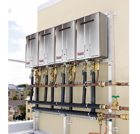Rinnai offers electrolytic inline scale inhibitors

Rinnai offers inline electrolytic scale-inhibitors for its continuous-flow water heaters in commercial installations. They significantly reduce the effect of limescale to maximise efficiency over the product’s life and are described as a low-maintenance way to project against the damaging and expensive impact of limescale on hot-water systems.
Another benefit of reducing limescale is cleaner surfaces inside the system, significantly reducing the problem of legionella.
A sacrificial zinc anode inhibits the formation of calcite in such a way that it does not adhere to the interior of a water heater or pipework. The treatment does not decay, and its effectiveness is not affected by water storage of agitation caused by water passing through a booster set.
The electrolytic inhibitor can be installed in the rising main so that one inhibitor system will treat the whole location.
For buildings with a BMS, a pulse splitter is an option to provide water flow rate or water-usage date to the BMS.
These scale protection units are available in eight sizes for pipes from 22 to 108 mm in diameter.








